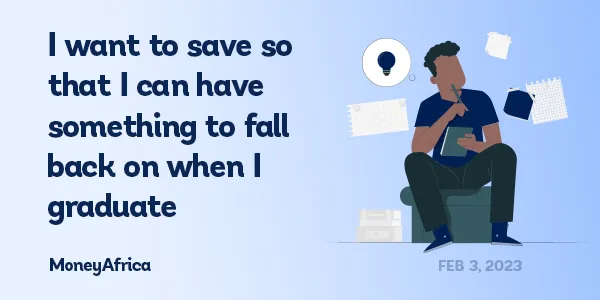Good Morning 😃
How are you doing?
Friday letters are usually dedicated to taking questions from our community. Do you have a question for us? Please feel free to
- send an e-mail to info@themoneyafrica.com; or
- send a DM to any of our social media channels, or
- simply fill out this form. Don’t worry, your responses are kept anonymous.
**
Question
I am a final-year student who is aiming at saving ₦500,000 this year. However, I battle with some financial issues and decisions. Often, I don’t have proper food to eat because I put my money in savings, so I snack a lot but this snacking system takes money too and the fact that it’s not even healthy but takes part of my money worries me.
What should I do?
I really want to save so that I can at least have something to fall back on when I graduate. I don’t have a job because I want to focus on finishing with a good CGPA. But at the same time, I want to eat proper and healthy foods.
Answer
To start with, it should be best to consider planning your meals. Make a grocery list of healthy and affordable food items. Planning your meals in advance will help you stay on track with your healthy eating habits and save money by avoiding impulse buys.
Also, consider cooking at home. This can save you money and help you control what you eat.
Instead of unhealthy snacks, opt for healthier options like fruits, nuts, and yoghurt, which can also save you money in the long run. Always remember that ‘health is wealth.’
Prioritise necessities like food and rent, and try to minimise non-essential expenses like eating out or shopping. You may also consider sharing the cost of groceries and cooking with a roommate or seeking out resources like food pantries, which can provide healthy meals at a reduced cost.
Also it appears you want to save N500,000 but you do not have a job. If you don’t have a job, finding money to save can be a challenge. Consider starting a side hustle at school, offering tutoring services to your schoolmates, looking for a freelance or part time job, starting an online business, among many other options. You should also manage your finances wisely by creating a budget and reducing expenses on things that aren’t needed. For example, you could use the 50:30:20 rule for budgeting. That is, spending 50% of your income on your needs, 30% on your wants and 20% on saving and investing.
In conclusion, Taking care of your health is important and will benefit you in the long run. It’s okay to prioritise your well-being and allocate some of your savings towards healthy eating habits.
***
Question
I am basically taking care of my nieces, my little brother and my mum. I’m also trying to save money to travel to the UK via the study route but every time I think about saving, something comes up and the money goes into that. I need advice on how to manage my funds, even if they aren’t enough.
Answer
To manage your funds more effectively, budgeting is very key. Create a budget that accounts for your monthly income and expenses including food, housing, transportation, and other necessities. This will help you track your spending and make adjustments where necessary.
In addition to budgeting, Identify the most essential expenses and prioritise them over the less important ones. This will help you stay on track with your goals and ensure that your family’s needs are met. Look for ways to reduce your monthly expenses, such as cutting back on entertainment, eating out, or other non-essential expenses.
Another effective way to manage your funds is to set up automatic transfers to your savings account every month to ensure that you are consistently setting aside money towards your goal.
Saving money is a process and it may take time to reach your goal. Stay focused, be consistent and be more disciplined with your spending.
Thank you for reading Money Africa’s Blog.
Please feel free to share it.
Do you have any questions? You can send an e-mail to info@themoneyafrica.com or send a DM to any of our social media channels.
***
MoneyAfrica premium plan
Are you a mid to high-income earner? Do you find communities a bit too busy? You should sign up for our premium plan.

You can learn more about that here.
***
We often get questions regarding how to plan your finances to align with your relocation plans, especially for students seeking to further their studies. As always, we have heard you, and we have put together an e-book to help you navigate this. Follow this link, to get your FREE copy of the e-book: The Japa Encyclopedia.
***
Get our annual subscription and learn more about investing safely and building a solid portfolio in 2023.
Don’t forget to:
- Join our community, if you want to smash your 2023 financial goals. It takes at least 30 days to build great habits that will last you a lifetime. So why not start now? There is a lot you can achieve.
- If you would like to document your financial journey in 2023, then our journal would be an excellent fit for you. It costs ₦7,500 (excluding delivery).
- Get a budget sheet to track your monthly expenses. Click here
- Get an investment tracker to be on top of all your investments. Click here
MoneyAfrica is a financial literacy platform. Our goal is to make everyone better with their finances.
We do this by engagements via our:
– social media handles
– platforms for paid community members (for adults and students)
– webinar sessions with corporate clients
Would you like to join any of the communities? Please click here
Would you like us to hold a webinar for your company? Please send an email to info@themoneyafrica.com


